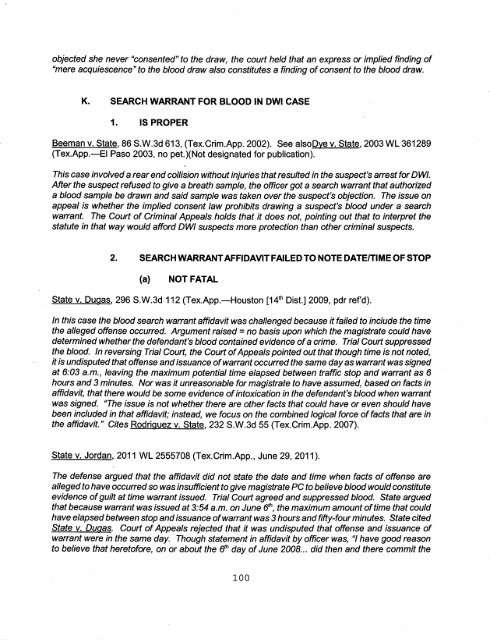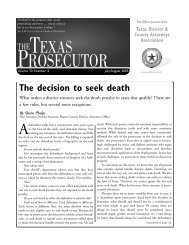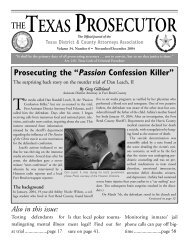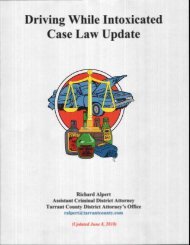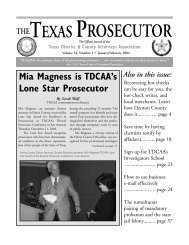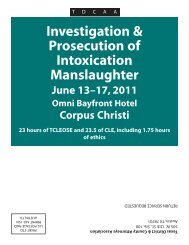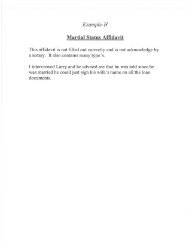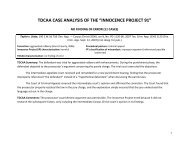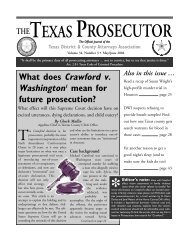Driving While Intoxicated Case Law Update - Texas District ...
Driving While Intoxicated Case Law Update - Texas District ...
Driving While Intoxicated Case Law Update - Texas District ...
Create successful ePaper yourself
Turn your PDF publications into a flip-book with our unique Google optimized e-Paper software.
objected she never "consented" to the draw, the court held that an express or implied finding of<br />
"mere acquiescence" to the blood draw also consfifufes a finding of consent to the blood draw.<br />
K. SEARCH WARRANT FOR BLOOD IN DWI CASE<br />
1. IS PROPER<br />
Beeman v. State, 86 S.W.3d 613, (Tex.Crim.App. 2002). See alsoDve v. State,2003 WL 361289<br />
(Tex.App.-El Paso 2003, no pet.)(Not designated for publication).<br />
Ihis case involved a rear end cottision without injuries that resulted in thesuspectb arrest for DWI.<br />
After the suspecf refused to give a breath sampte, the officer got a search warrant that authorized<br />
a blood sample be drawn and said sample was taken over the suspecf's objection. The issue on<br />
appeal is whether the implied consent law prohibits drawing a suspecf's blood under a search<br />
warrant. The Court of .Criminal Appeals holds that it does not, pointing out that to interpret the<br />
statute in that way would afford DWI suspects more protection than other criminalsuspecfs.<br />
2. SEARCH WARRANTAFFIDAVIT FAILED TO NOTE DATE/TIME OF STOP<br />
(a) NOT FATAL<br />
State v. Duqas, 296 S.W.3d 112 (Tex.App.-Houston [14th Dist.]2009, pdr ref'd).<br />
In this case fhe blood search warrant affidavit was challenged because it failed to include the time<br />
the alleged offense occurred. Argument rar'sed = no basrs upon which the magistrate could have<br />
determined whetherthe defendant's blood contained evidence of a crime. Trial Court suppressed<br />
the blood. ln reversing Trial Court, the Court of Appeals pointed out that tttough time is not noted,<br />
it is undisputed that offense and iss uance of warrant occurred the same day as warrant was sgned<br />
at 6:03 a.m., leaving the maximum potential time elapsed between traffic stop and warrant as 6<br />
hours and 3 minutes. Nor was it unreasonable for magistrate to have assumed, based on facts in<br />
affidavit, thatthere would be some evidence of intoxication in the defendant's blood when warrant<br />
was signed. "The issue is not whether there are other facts that could have or even should have<br />
been included in that affidavit; instead, we focus on the combined logical force of facts that are in<br />
the affidavit." Cites Rodriquez v. State, 232 S.W.3d 55 (Tex.Crim.App. 2007).<br />
State v. Jordan,2011WL 2555708 (Tex.Crim.App., June 29, 2011).<br />
The defense argued that the affidavit did not state the date and time when facts of offense are<br />
alleged to have occurred so was insufficient to give magistrate PC to believe blood would constitute<br />
evidence of guilt at time warrantissued. Trial Court agreed and suppressed b/ood. State argued<br />
that because warrant wasrssued at 3:54 a.m. on June 6h, the maximum amount of time that could<br />
have elapsed between sfop and r'ss uance of warrant was 3 hours a nd fifty-four minutes. State cited<br />
Sfafe v. Duoas. Court of Appeals rejected that it was undisputed that offense and issuance of<br />
warrant were in the same day. Though statement in affidavit by officer was, "l have good reason<br />
to believe that heretofore, on or about the dh day of June 2008... did then and there commit the<br />
100


